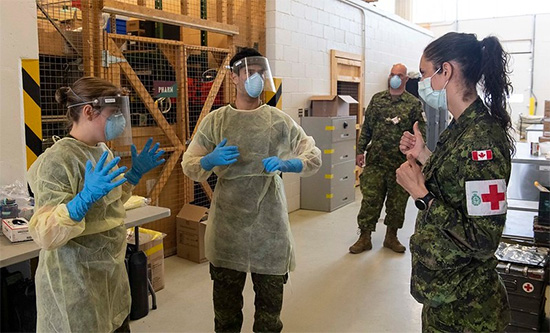Defence research supports COVID-19 response
July 19, 2021 - Defence Stories

Caption
Canadian Armed Forces members wear personal protective equipment (PPE) while performing operational duties in long-term care facilities during Op LASER.
Over the past year and a half, Defence Research and Development Canada’s scientists and researchers have demonstrated their agility and versatility by rapidly adapting a wide range of operational programs and research projects to address the new challenges facing Canadian Armed Forces (CAF) members during a pandemic.
When COVID-19 hit, the heat and discomfort of wearing masks and other personal protective equipment (PPE) became a common complaint, which is why the Surgeon General asked DRDC to examine the potential impacts on CAF members wearing PPE while performing operational duties in long-term care facilities, as part of Operation LASER.
“By design, PPE materials are impermeable to moisture transfer to shield the wearer from incoming pathogens. However, this same property also prevents outgoing vapour transfer, restricting sweat evaporation and thereby aggravating heat stress,” says Dr. Matthew Cramer, from the DRDC Toronto Research Centre.
Dr. Cramer modelled the heat strain of wearing PPE under a range of conditions. His study found that while the risk of heat-related illness is likely low, except when doing strenuous work in very warm conditions above 30 °C, dehydration and the sensation of warmth from wearing PPE for long periods of time can have mild effects on attention and decision-making, even at lower temperatures. As a result, Dr. Cramer made recommendations for cooling and scheduling breaks to assist CAF members in performing their duties.
Scientists from DRDC Toronto Research Centre are also researching several potential treatments for COVID-19 by building on existing collaborations with Canadian Forces Health Services (CFHS), the Canadian Institute for Military and Veteran Health Research and St. Michael’s Hospital. One example is Dr. Henry Peng and Dr. Shawn Rhind’s research, with LCol Andrew Beckett from CFHS, on a new potential use for freeze-dried plasma. DRDC has a long-standing research interest in freeze-dried plasma, which can be rehydrated with water in minutes and transfused into patients as a life-saving measure for traumatic blood loss.
Early in the pandemic, Canadian Blood Services launched a national trial to determine if plasma from people who have recovered from COVID-19 (known as convalescent plasma), can be used to help others recover from the virus. Dr. Peng and Dr. Rhind wanted to know if the COVID-neutralizing antibodies in convalescent plasma remain stable in freeze-dried form. If successful, this research could result in a stockpile of freeze-dried plasma which could be stored for up to five years to protect CAF members and the Canadian public against future waves of viruses.
“There could be potential applications for passive immunization or as an interim therapy for people who do not have access to vaccines,” Dr. Rhind says about this ongoing research.
Meanwhile, DRDC Suffield Research Centre personnel have provided essential support to continued CAF operations throughout the pandemic, including Maritime Forces Pacific (MARPAC) operations and Exercises MAPLE RESOLVE, AGILE RAM I/II, and others, by processing the lion’s share of their COVID-19 tests.
“They are the silent warriors who enabled operations to continue in a pandemic posture,” says Major Amy Godwin from the COVID Operational Testing Coordination Cell.
To enable new and ongoing domestic and international CAF operations DRDC Suffield validated sample collection methods, which included processing approximately 2,500 sample tests, and then ramped up capacity to generate results in less than 24 hours to support command decisions. In the first six months of 2021, DRDC Suffield processed more than 10,500 COVID-19 tests, representing more than 44 per cent of the 23,646 CAF operational tests completed domestically.
These three examples are the tip of the iceberg of DRDC’s rapid and agile COVID-19 response, as part of its ongoing commitment to developing diverse science and technology solutions to meet the current and future needs of the CAF.